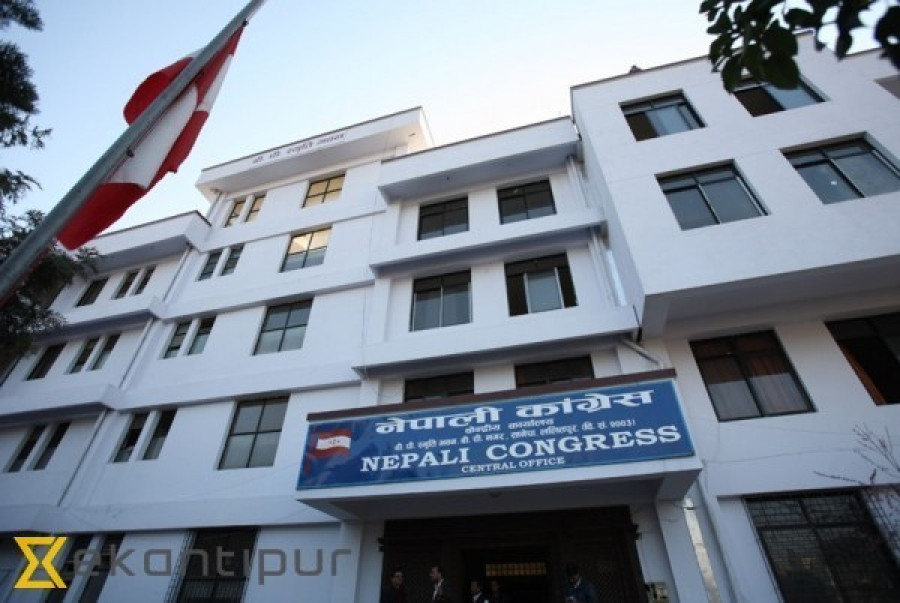National
Nepali Congress-formed economic task force suggests smaller budget amid Covid-19 crisis
The committee also suggested a number of measures to rescue the economy marred by the Covid-19 pandemic.
Prithvi Man Shrestha
A special committee on economy formed by the Nepali Congress has suggested that the size of the budget for the next fiscal be substantially reduced in view of the Covid-19 crisis.
The committee, headed by Former Finance Minister Ram Sharan Mahat and composed of other former finance ministers, former ministers, former vice-chairman of the National Planning Commission and other economists, also suggested a number of measures to rescue the economy marred by the Covid-19 pandemic.
In its report ‘NC-Covid Policy Imperative’, submitted to party President Sher Bahadur Deuba on Sunday, the committee has suggested that a budget of around Rs1.35 trillion-Rs1.4 be prepared given the likely shortfall in revenue collection amid the Covid-19 pandemic and the government's poor spending capacity.
The main opposition party’s recommendations come as the government prepares to present its budget for 2020/21, on May 28.
According to the report, the federal government is expected to collect an estimated revenue of Rs 850-Rs 900 billion after sharing it with provincial and local governments. Internal debt amounting to Rs 200 billion and foreign loans of around Rs 225 billion can also be raised.
The amount of foreign grants coming to the country will depend on progress made in implementation of projects, according to the report.
“By incorporating unspent budget this fiscal year and utilising overdraft that can be taken from the Nepal Rastra Bank, a budget of Rs 1.35 trillion to Rs 1.4 trillion will be realistic,” the report said.
The government had planned to spend Rs1.53 trillion this fiscal (2019/20). However, the target was lowered due to poor spending on the part of government agencies.
Earlier, the Finance Committee under the House of Representative had recommended that the government plan to spend Rs1.7 trillion in 2020/21.
Task force leader Mahat told the Post that the committee came up with numbers for the size of the budget considering the government's capacity to raise money and spend it.
Given the limited resources authorities have, the report has suggested the government to take cost cutting measures, reprioritise sectors and maintain financial discipline.
In order to cut costs, the report has suggested the implementation of the report prepared by the Public Expenditure Review Commission 2075, which has suggested that the number of ministries be reduced by six, departments by 35, employees by 45,000, and development committees, commissions and boards by 23.
“After the Nepali Congress-led government was formed in 1992, the number of government employees was reduced by 25 percent. This had improved the performance of the bureaucracy,” said Mahat, adding that the government can take the initiative by implementing the latest report by the Public Expenditure Review Commission.
The report has also suggested that the controversial Local Infrastructure Development Partnership Programme, led by lawmakers, also be suspended.
Both the communist and Nepali Congress-led governments have long been continuing the programme which has become controversial for allowing lawmakers to use resources for their small-scale pet projects.
“In the past when we didn't have local government, the programme could be defended as a tool to reach out to the local people,” said Mahat.
“But now, this programme is no longer needed at a time when limited resources are to be reprioritised.”
The government has allocated Rs 60 million per lawmaker in the current fiscal year for 165 electoral constituencies.
As most of the projects under this scheme are not being implemented due to Covid-19 pandemic, there is growing call for the withdrawal or diversion of the resources to fight Covid 19.
Given the impact of the pandemic on every sector of the economy, the Congress-commissioned report has suggested ways to get the economy going and providing relief measures for affected sectors to generate employment.
According to the report, the country’s economy is likely to grow by just one percent, although the Central Bureau of Statistics last month projected a growth of 2.27 percent provided that all sectors, except for hospitality and international travel, resume from mid-May.
But, that hasn't happened as the number of Covid-19 cases continues to surge every day.
For the poor and those who have lost their jobs due to the pandemic, the taskforce has suggested that the government guarantee employment for 100 days and ensure income of at least Rs 51,700 per household for a year.
For this, about 700,000 people can be employed in infrastructure while 300,000 people can be provided apprenticeship under partnerships between the government and the private sector.
Given the possibility of a large number of migrant workers returning to the country, the report has suggested that more work be created in the agriculture sector.
For this, local and provincial governments need to provide skill training and orientation classes to returnee workers and help them engage in commercial farming.
It has also suggested revamping the Prime Minister Employment Programme with the provision that unemployed youths get skill training in agriculture, manufacturing and construction.
In the tourism and industrial sector hit hard by the pandemic, the taskforce has suggested restructuring of loans. The report has also suggested providing subsidies in the form of low interest rates to industries of all sizes for a year.




 8.43°C Kathmandu
8.43°C Kathmandu














